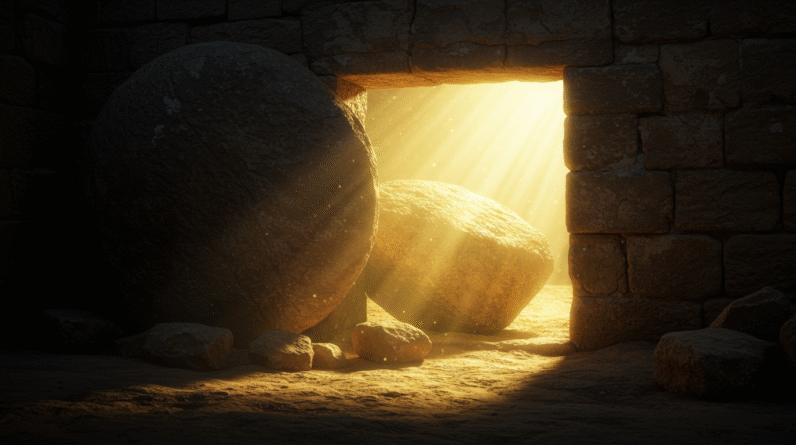The Resurrection Of Jesus: The Greatest Victory Over Death
You’re holding a story that has shaped the lives of millions across two millennia: the Resurrection of Jesus. This event is not simply a theological point or a distant miracle to be catalogued and admired; it’s the hinge upon which hope swings for you and everyone who has ever wondered what happens after the last breath. In a world where death seems final, the Resurrection of Jesus speaks with a voice that interrupts despair and offers a living hope. As you read, you’ll see the Resurrection presented not only as a historical reality but as the living proof of Jesus’ divinity and the guarantee of eternal life for all who trust in Him.
Why the Resurrection of Jesus Matters to You
When you think about your fears, the most primal is often the fear of death—of loss, of emptiness, of an end with no future. The Resurrection of Jesus addresses that fear head-on. It says that death is not the last word, that life has been breathed back into what seemed irreversible. This matters to you because it reframes everything: pain, sorrow, purpose, and your eternal destiny. If the Resurrection is true, then the promises of God are anchored in reality; if it is not, then faith collapses into wishful thinking. The Apostle Paul knew this tension and wrote that “if Christ has not been raised, your faith is futile” (1 Corinthians 15:17). That’s why the Resurrection of Jesus is central to Christian faith—because it confirms that God has broken the power of death.
The Historical Facts Behind the Resurrection of Jesus
You don’t have to approach the Resurrection as mere mythology. The New Testament presents the Resurrection of Jesus with specific, historical markers: an empty tomb discovered by women, multiple appearances to eyewitnesses, and the transformed lives of those who had known Him intimately. The Gospel accounts describe women coming to the tomb at dawn and finding the stone rolled away and the tomb empty (Luke 24:1-7; Mark 16:6). John records Mary Magdalene seeing the risen Lord and mistaking Him for the gardener until He calls her by name (John 20:1-18). These are not vague tales; they are detailed testimonies given by those who lived through them.
The Apostle Paul summarizes the eyewitness testimony in a way that reads like courtroom evidence: that Christ died, was buried, was raised on the third day, and appeared to Cephas (Peter), the Twelve, and more than five hundred brothers and sisters at one time—many of whom were still alive when Paul wrote, able to corroborate his words (1 Corinthians 15:3-8). When you examine the record, you find witnesses who were honest and even skeptical at first, but who were transformed by what they had experienced. That transformation is itself an important piece of historical evidence for the Resurrection of Jesus.
The Empty Tomb: A Historical Starting Point
You might ask: Why is the empty tomb so important? Because it provides a tangible, verifiable fact around which testimony revolves. If Jesus’ body had been in the tomb, there would have been no movement to proclaim resurrection. The early opponents of Christianity didn’t produce a body; rather, they offered explanations that wrestled with the reality of an empty tomb. The Gospels present the discovery of the empty tomb as the initial, irrefutable datum that required explanation, and the simplest, most coherent explanation recorded in Scripture is that the Resurrection of Jesus had occurred.
The Resurrection of Jesus as Proof of Divinity
If you’re wrestling with who Jesus really is, the Resurrection is the clearest demonstration. Scripture teaches that the Resurrection is the divine stamp of approval that declares Jesus to be the Son of God. Paul states this directly when he writes that Jesus “was declared to be the Son of God in power according to the Spirit of holiness by his resurrection from the dead” (Romans 1:4). You can see how the early preachers used this fact to proclaim Jesus’ identity: Peter, standing in Jerusalem, declared that God “has raised this Jesus to life, and we are all witnesses of the fact” and then affirmed Jesus’ lordship and messiahship in the hearing of the crowd (Acts 2:32-36).
You should understand that the Resurrection of Jesus is not merely an uplifting story about life after death; it is the divine attestation that Jesus is who He claimed to be. When the grave could not hold Him, the authority of His words and the power of His work were vindicated. That vindication is the foundation of Christian proclamation: Jesus is risen, and therefore His claims about God, sin, and salvation carry ultimate authority.
Resurrection as the Vindication of Jesus’ Teachings
When you read the teachings of Jesus—about forgiveness, about the kingdom of God, about the cost of discipleship—you’re faced with a crucial question: are these claims true? The Resurrection of Jesus answers that question decisively. If Jesus rose from the dead, then His teaching about God’s power over sin and death is validated. You can trust Him not merely as a moral teacher but as the living Lord who backs His words with life.
The Resurrection of Jesus as a Guarantee of Eternal Life
You need hope not just for the present but for the future. The Resurrection of Jesus provides that hope by guaranteeing that death is not the end for those who belong to Him. Jesus Himself said, “I am the resurrection and the life. The one who believes in me will live, even though they die” (John 11:25). This is not metaphorical consolation; it is the promise that because He lives, you will also live. Paul expresses the same truth theologically when he explains that Christ has been raised and therefore becomes the “firstfruits” of those who have died, promising that because He was raised, all will be made alive in Him (1 Corinthians 15:20-22).
What this means for you today is profound: your life is placed in the context of God’s eternal plan. The Resurrection of Jesus transforms death from a final sentence into a gateway to fuller life. It means that the promises of God for forgiveness, restoration, and intimate fellowship with Him are not mere hopes—they are anchored in the reality of Jesus’ risen life.
New Birth and Living Hope
Your response to the Resurrection can be personal and immediate. Peter tells believers that because of Jesus’ resurrection, you have “a new birth into a living hope through the resurrection of Jesus Christ from the dead” (1 Peter 1:3). This new birth is not just an emotional uplift; it’s a reorientation of your identity. You are no longer defined by failure, sin, or the certainty of death; you are defined by the living hope secured in the Resurrection of Jesus.
How Early Witnesses Experienced the Resurrection
You’re not reading secondhand hearsay without witnesses. The Resurrection of Jesus was experienced in concrete ways by men and women who touched Him, ate with Him, and spoke with Him after He rose. Thomas, who doubted until he saw the marks of the nails, touched Jesus’ wounds and cried out, “My Lord and my God!”—a moment that grounds belief in encounter (John 20:24-29). Mary Magdalene encountered the risen Jesus in a garden and was commissioned to tell the disciples, becoming the first evangelist of the Resurrection (John 20:11-18).
The disciples’ skepticism turned to conviction as they encountered the risen Christ. Peter, once hidden and fearful, now preached boldly, even in the face of persecution. Paul, once a persecutor of the church, encountered the risen Lord on the road to Damascus and was forever transformed (Acts 9:1-19). Their experiences were not private visions alone; they affected entire communities and gave birth to a movement that would change history. When you consider the Resurrection of Jesus, remember that you are engaging with an event that produced tangible transformation in the lives of ordinary people like you.
Appearances That Transformed Lives
The risen Jesus appeared in a variety of settings: to the gathered disciples in a locked room, to two travelers on the road to Emmaus, to more than five hundred people at once, and to His disciples by the Sea of Galilee (Luke 24:13-35; 1 Corinthians 15:6). Each appearance served a purpose: to convince, to commission, to comfort, and to call His followers into mission. When you study these encounters, you see that the Resurrection of Jesus is not abstract—it’s relational. The risen Christ meets people in their brokenness and sends them back into the world with purpose.
What the Resurrection Changes About Death
You are invited to see death through the lens of the Resurrection. Paul uses powerful imagery to explain how death is swallowed up in victory: “Death has been swallowed up in victory… Thanks be to God! He gives us the victory through our Lord Jesus Christ” (1 Corinthians 15:54-57). This is not a denial of sorrow nor a dismissal of grief; the Resurrection actually dignifies mourning by offering a future hope that grief alone cannot provide. It assures you that the wounds of the world are not ultimate.
Beyond comfort, the Resurrection means that the powers of sin and death have been defeated. Revelation captures Jesus’ own words to the church: “I am the Living One; I was dead, and now look, I am alive for ever and ever!” He holds the keys of death and Hades (Revelation 1:18). That declaration means you are not left to the domain of the grave; the Lord who rose has authority over your final destiny. The Resurrection of Jesus transforms your perspective on suffering, enabling you to live in hope and courage even amid trials.
The Power of the Holy Spirit and Resurrection Life
The same power that raised Jesus from the dead is at work within believers. Paul states that the Spirit who raised Christ from the dead will also give life to your mortal bodies through the Spirit who dwells in you (Romans 8:11). This is not abstract theology; this is personal assurance that the life you need now and the life you will receive in eternity are both sourced in the Resurrection of Jesus. You are invited into a present reality of resurrection power that sustains and renews you.

The Resurrection is Central to the Gospel
When you look at the message of Christianity, the Resurrection is not an optional add-on—it is the heart of the Gospel. Paul summarized the core of the Gospel by saying that Christ died for our sins, was buried, and was raised on the third day in accordance with the Scriptures (1 Corinthians 15:3-4). If you remove the Resurrection, you remove the essential validation of Jesus’ atoning work. He died to pay the penalty for sin; He rose to demonstrate victory over sin and death.
Furthermore, the Resurrection links directly to justification and new life. Paul explains that Jesus was “delivered over to death for our sins and was raised to life for our justification” (Romans 4:25). In other words, the Resurrection does not merely return Jesus to life; it establishes the basis for your reconciliation with God. When you embrace the Resurrection of Jesus, you embrace the promise that your sin can be forgiven and your relationship with God restored.
The Firstfruits of a Greater Harvest
Paul uses agricultural imagery to show how Christ’s Resurrection secures the future resurrection of believers: Christ is the “firstfruits,” the first to rise in glorified life, guaranteeing that more will follow (1 Corinthians 15:20). This assures you that salvation is not merely spiritual escape but a holistic transformation—body and soul. The Resurrection of Jesus is the pledge that God will make all things right, including the renewal of your body.
Living in the Light of the Resurrection
How should you live in response to the Resurrection of Jesus? First, live with hope. Peter speaks of believers being “born again to a living hope” through the Resurrection (1 Peter 1:3). That hope informs your actions, your priorities, and your courage in the face of suffering. Second, live in obedience. The Resurrection calls for a life that reflects the power that raised Christ from the dead—newness of life, holiness, and sacrificial love. Paul urges you to consider yourselves “dead to sin” but “alive to God in Christ Jesus” (Romans 6:4-5).
Third, live with purpose. The risen Lord commissioned His followers to make disciples of all nations, baptizing and teaching them in His name. The Resurrection of Jesus sends you into the world with a message of hope and transformation. When you live in the light of the Resurrection, your life becomes a testimony—an invitation to others to meet the living Christ.
Suffering in Light of Resurrection Hope
You will face suffering and trials; this is unavoidable in a fallen world. Yet the Resurrection changes the meaning of suffering. Paul wrote that to know Christ and the power of his resurrection is to participate in Christ’s sufferings so that you may also share in His glory (Philippians 3:10-11). This perspective does not glorify pain but gives it a context: suffering can refine faith and draw you deeper into reliance on the risen Savior. The Resurrection assures you that pain is temporary and purposeful under God’s sovereign plan.
Doubts, Questions, and Honest Faith
You’re not alone if you have doubts about the Resurrection of Jesus. Faith is not the absence of questions; it’s trusting when answers aren’t yet fully clear. Jesus Himself acknowledged the struggle of belief and blessed those who believe without seeing (John 20:29). Yet He also made room for questions—Thomas was welcomed to touch and see, not condemned for his honesty (John 20:24-29). The New Testament invites you to bring your doubts into the light, to examine the evidence, and to allow a personal encounter with the risen Christ to answer the deepest longings of your heart.
Engage with the historical, textual, and experiential evidence. Read the Gospel accounts, study the transformation of the disciples, and consider the spread of the early church. Above all, don’t be afraid to ask God for the gift of faith. Scripture promises that when you seek with an honest heart, God responds. The Resurrection is not a puzzle beyond access—it’s an invitation to relationship.
The Resurrection and Your Personal Response
Now, what will you do with the Resurrection of Jesus? The New Testament consistently calls for a response: repent, believe, be baptized, and follow. When Peter preached the message of Jesus raised from the dead, his audience was “cut to the heart” and asked, “What shall we do?” His answer was clear: “Repent and be baptized, every one of you, in the name of Jesus Christ for the forgiveness of your sins” (Acts 2:36-38). This is not a legalistic checklist but a call to turn from the way of death to the way of life, to receive the risen Savior as Lord and King of your life.
If you have trusted in Jesus before, the Resurrection invites you to renew your devotion—take up your cross, walk in newness of life, and live in the conviction that your present trials are shaping an eternal glory. If you have never surrendered to Christ, the Resurrection offers you a fresh start. You can come as you are, confess your need, and receive the gift of new life that only He can give.
A Simple Prayer to Begin
If you want to respond right now, speak simply from your heart. Say something like: “Lord Jesus, I believe You died for my sins and rose again. I invite You into my life as my Savior and Lord. Forgive me, help me, and lead me by Your Spirit. Thank You for the gift of eternal life.” If you say this in genuine faith, Scripture promises that you will become a new creation and receive a living hope in Christ.
The Resurrection as a Living Reality
You may still wonder how a 2,000-year-old event can be alive today. The answer is found in the ongoing work of the risen Christ and the presence of the Holy Spirit. Jesus promised that He would be with His people always, and that presence is not merely a spiritual abstraction; it is the living reality that guides, comforts, corrects, and empowers you. The Resurrection of Jesus is the foundation of that present help. He reigns now at the right hand of the Father, interceding for you, and will one day return to consummate His kingdom and fully abolish death (Acts 1:3; 1 Corinthians 15:24-28).
As you live in the power of the Resurrection, you will find that your hope is more than wishful thinking; it is grounded in the person and work of Jesus Christ, who was dead and now lives. The Resurrection is the anchor of your soul, holding you steady when storms come and promising a morning when all pain and death will be no more.
Final Invitation: The Resurrection Calls You to Life
If the Resurrection of Jesus has stirred something in you—curiosity, hope, conviction—don’t let it pass as a mere thought. The risen Lord calls you to respond. He offers forgiveness where guilt has weighed you down, purpose where meaning has been lost, and an everlasting relationship where loneliness has reigned. The Gospel is simple and profound: Christ died for your sins, was buried, and was raised on the third day, and because He lives, you can live too (1 Corinthians 15:3-4; John 11:25).
If you have believed, rejoice and renew your commitment to follow Him. If you have not yet believed, take a step of faith today. Speak to God honestly, ask for forgiveness, and invite Jesus to be Lord of your life. The Resurrection of Jesus is more than history—it is the greatest victory over death, offered to you as a living promise.
May you know the peace that comes from standing before the risen Christ, the joy of knowing that death has been defeated, and the certain hope of eternal life.
Explore More
For further reading and encouragement, check out these posts:
👉 7 Bible Verses About Faith in Hard Times
👉 Job’s Faith: What We Can Learn From His Trials
👉 How To Trust God When Everything Falls Apart
👉 Why God Allows Suffering – A Biblical Perspective
👉 Faith Over Fear: How To Stand Strong In Uncertain Seasons
👉 How To Encourage Someone Struggling With Their Faith
👉 5 Prayers for Strength When You’re Feeling Weak

📘 Jesus and the Woman Caught in Adultery – Grace and Mercy Over Judgement
A powerful retelling of John 8:1-11. This book brings to life the depth of forgiveness, mercy, and God’s unwavering love.
👉 Check it now on Amazon
As a ClickBank & Amazon Affiliate, I earn from qualifying purchases.
Acknowledgment: All Bible verses referenced in this article were accessed via Bible Gateway (or Bible Hub).
“Want to explore more? Check out our latest post on Why Jesus? and discover the life-changing truth of the Gospel!”






